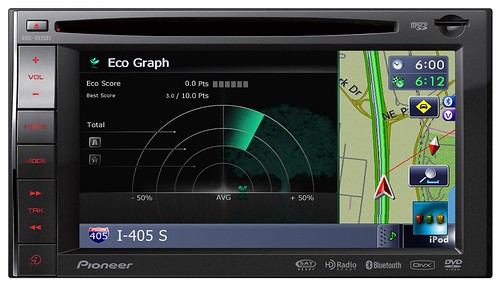Smokin’ Radio

Pioneer came out with a smokin’ car radio — actually a super device — at CES last week. The AVIC-X920BT can do everything you can think of in a car.
Engadget picked up on one feature: streaming Pandora via your iPhone:
Your car’s dash just got a tad bit more interesting with the introduction of Pandora music streaming in Pioneer’s latest navigation unit. The double-DIN in-dash device exploits your iPhone’s cellular connection to glean tunes from the ether and comes with a 6.1-inch display, Bluetooth, 3D video accelerator, and 4GB of built-in memory expandable by MicroSD.
Interesting. I do that with my iPhone, too. Slacker, Last.fm and many other apps let your stream audio. Do I lose signal? Sure I do. Not as much as with satellite radio under tree cover, however. Pandora is essentially free. Sirius XM is not.
The folks at TheStreet.com see more than just a neat product. They see the beginning of the end for Sirius XM:
A long-feared, potential threat to Sirius XM Radio has become real for many tech-sector observers, prompting them to wonder whether the satellite radio company has reached the beginning of its end.
At last week’s kick-off of the 2010 annual Consumer Electronics Show, one of the world’s largest tech-trade shows, Pioneer unveiled a new car stereo that can detect Pandora Internet radio settings from iPhones or iPods — which could then be translated into convenient access for the users to their favorite Pandora channels while driving.
Pandora’s potential has been tantalizing from the moment it was launched in 2000, much of it owing to its Music Genome Project — an ongoing compilation of painstakingly-detailed musical data analysis that Pandora has been using to create customized music stations for individual users.
Through the project, the company has steadily added listeners every year, doubling to more than 40 million in 2009, compared to Sirius’ roughly 18 million subscribers as of December.
Through Pandora, users can access tunes via their Android, BlackBerry, iPhone, Palm Pre and Windows Mobile phones.
Ted Cardenas, a Pioneer director of marketing, told the Wall Street Journal that he sees the creation as an opportunity to reach out to an entirely new group of consumers. This has led some observers to conclude that the new Pioneer AVIC-X920BT will threaten the very survival of Sirius, once it becomes available to the market in March.
The choice for the marketplace will therefore be one between a selection of free, Internet radio programming automatically customized to one’s personal tastes versus the subscription-based services of a commercial-free satellite radio company.
Sirius currently offers various subscription packages ranging from about $13 to $20 a month.
Drivers and car owners have represented a large portion of Sirius’ subscriber base, given that vehicles come with the radio installed. Therefore, much of Sirius’ profits have been tied to the success of the auto-industry, which has yet to make a full recovery.
The poll agrees with what I think: Sirius XM will hold on to their subscribers.
Audio streaming to mobile devices is a good alternative, but it’s not a substitute for satellite radio. No cell service, no audio stream. With satellite radio, you get it everywhere.